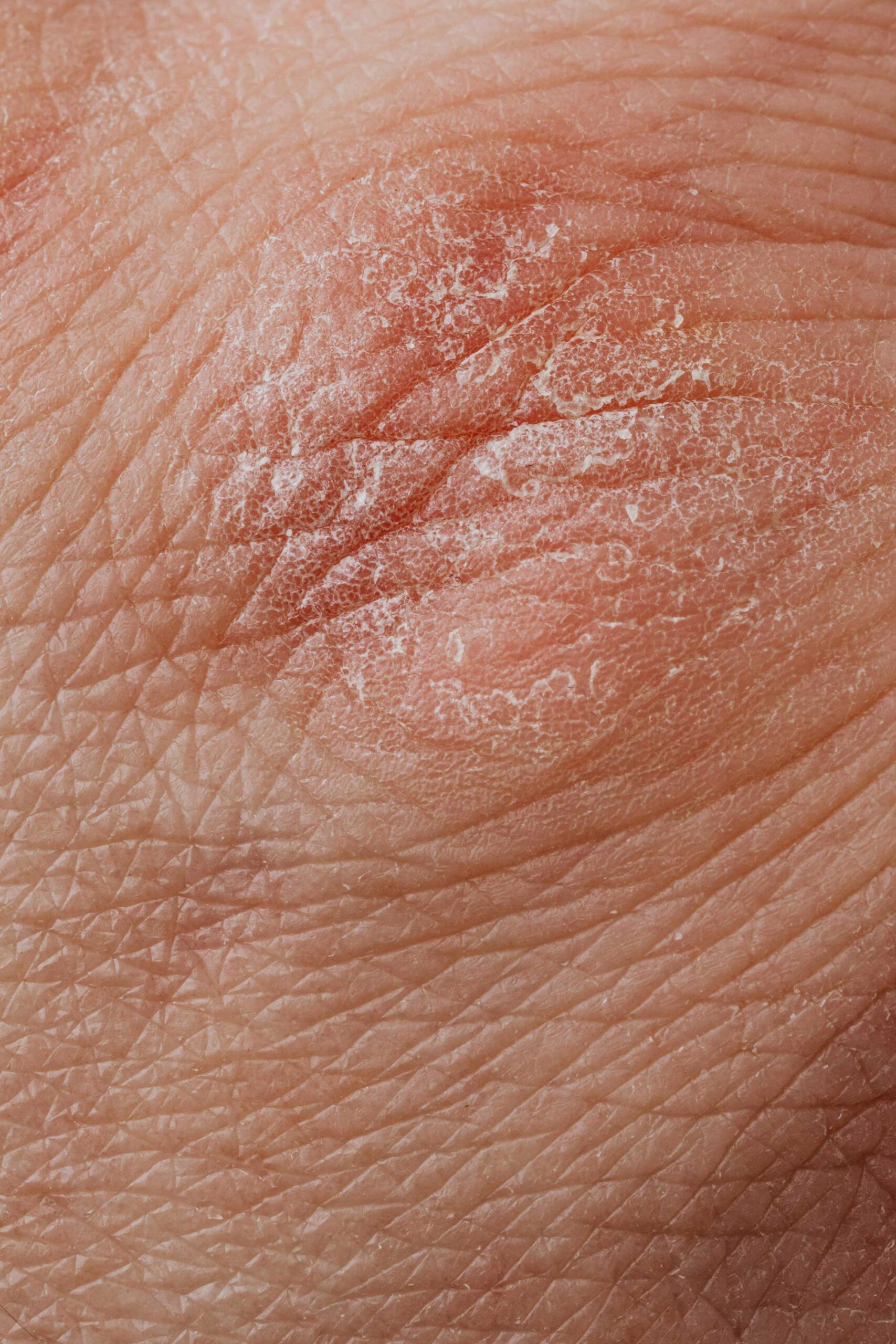Are you dealing with psoriasis (or treating someone who is), and everyone’s focused on what’s happening on the skin. Topical treatments, maybe some systemic medications, lifestyle modifications. But what if I told you that some of the most important action might actually be happening in your gut?
Maybe you don’t know this about me, but I started studying nutrition and then functional medicine BECAUSE I was working with the skin, and I recognised the need to dig deeper than surface level. And honestly? Once you see the connection between the gut and the skin, you can’t unsee it.
It’s Not Just Correlation, It’s Communication
It’s fascinating to learn that your gut and your skin are in constant conversation.
Think about it this way: both your intestinal lining and your skin are barrier organs. They’re your body’s first line of defense against the outside world. When one barrier becomes compromised, it often affects the other. But the connection goes much deeper than that.
The science behind the gut-skin axis involves:
- Shared origins (both develop from the same type of cell)
- Similar immune surveillance systems
- Overlapping microbiome influences
- Connected inflammatory pathways
- Shared neurotransmitter and hormone receptors
When your gut health is compromised, it doesn’t just stay local. It sends inflammatory signals throughout your entire system, including to your skin.
What the Research Actually Shows
The data on gut health and psoriasis is pretty compelling, and it keeps growing:
Studies consistently show that people with psoriasis have:
- Significantly altered gut microbiome composition compared to healthy controls
- Reduced microbial diversity (which we know is linked to immune dysfunction)
- Higher rates of intestinal permeability (“leaky gut”)
- Increased prevalence of SIBO (small intestinal bacterial overgrowth)
- Higher rates of inflammatory bowel conditions
- Different short-chain fatty acid production patterns
But here’s what I find most interesting: when we improve gut health, we often see improvements in skin manifestation that go way beyond what we’d expect from topical treatments alone.
The Leaky Gut-Psoriasis Connection
A lot of the time, it’s helpful to start our thinking with the gut wall.
When your intestinal barrier becomes compromised (whether from stress, infections, medications, food reactivity, or toxin exposure) larger molecules that shouldn’t normally cross into your bloodstream start getting through.
Your immune system sees these as foreign invaders and mounts an inflammatory response. But this inflammatory response doesn’t stay localized to your gut.
The inflammatory cytokines (like TNF-α, IL-17, and IL-23) that get released travel throughout your system, including to your skin. These are the exact same inflammatory mediators we see elevated in psoriasis lesions.
So essentially, what starts as gut inflammation can manifest as skin inflammation. Your psoriasis patches might actually be your skin’s way of expressing systemic inflammatory burden that originated in your digestive system.
The Microbiome Factor
Your gut microbiome, those trillions of bacteria living in your digestive system, play a huge role in immune regulation. When this community becomes imbalanced (what we call dysbiosis), it can trigger autoimmune responses.
In psoriasis, we might see:
- Reduced beneficial bacteria like Bifidobacterium and certain Lactobacillus strains
- Overgrowth of potentially inflammatory species
- Decreased production of short-chain fatty acids (which are crucial for immune regulation)
- Altered bile acid metabolism
- Changes in how the microbiome communicates with immune cells
The beautiful thing? This is often modifiable. Unlike genetics, your microbiome can change relatively quickly with the right interventions.
For Practitioners: What This Means Clinically
When you have a psoriasis patient who’s tried elimination diets, topical treatments, and maybe even some systemic approaches without seeing improvement, here’s what I’ve learned to look for:
Testing that can be game-changing for psoriasis:
- Comprehensive stool analysis (not just basic parasitology)
- Zonulin and other intestinal permeability markers
- SIBO breath testing
- Food reactivity panels (but interpreted in context, not as standalone “avoid lists”)
- Inflammatory markers that reflect systemic burden
Clinical patterns to watch for:
- Digestive symptoms that seem “unrelated” to the skin condition
- History of antibiotic use, especially repeated courses
- Chronic stress or trauma history
- Food triggers that seem to worsen skin symptoms
- Other autoimmune conditions (the gut connection often underlies multiple manifestations)
For Patients: Understanding Your Body’s Signals
If you’re dealing with psoriasis, this gut connection might actually be really empowering news. Why? Because it means you have more influence over your condition than you might have thought.
Signs your gut health might be contributing to your psoriasis:
- Digestive symptoms (bloating, irregular bowel movements, food sensitivities)
- Flares that seem connected to stress or certain foods
- History of frequent antibiotic use
- Other autoimmune or inflammatory conditions
- Skin improvements when you’ve done gut-focused interventions
Things you can start exploring:
- Working with a practitioner who understands the gut-skin connection
- Keeping a food and symptom diary to identify potential triggers
- Supporting your microbiome with diverse, fiber-rich foods
- Managing stress (this directly impacts gut barrier function)
- Considering comprehensive gut health assessment
The Healing Pathway
Here’s what I love about understanding this connection: it opens up so many more possibilities for healing.
Instead of just managing symptoms, we can start addressing root causes. Instead of feeling like psoriasis is something that just “happens to you,” you can start understanding it as your body’s way of communicating about deeper imbalances.
The gut healing approach often involves:
- Identifying and removing inflammatory triggers
- Supporting intestinal barrier repair
- Rebalancing the microbiome
- Addressing underlying infections or overgrowths
- Supporting the body’s natural detoxification processes
- Managing stress and supporting nervous system regulation
It’s Not Always Linear (And That’s Okay)
Gut healing isn’t always a straight line to skin improvement. Sometimes things get worse before they get better. Sometimes you need to address multiple factors simultaneously. Sometimes the timeline is longer than you’d like.
But, when we address gut health as part of a comprehensive approach to psoriasis, people often experience improvements that go way beyond just clearer skin: better energy, improved mood, better digestion, and more resilience to stress.
The Bigger Picture
Understanding the gut-skin connection reminds us that autoimmune conditions like psoriasis are rarely about just one system. Your body is interconnected, and healing often requires addressing multiple aspects of health simultaneously.
This doesn’t mean you need to do everything at once or that it has to be overwhelming. It means you have options. It means there are practitioners who understand this complexity. It means your skin condition might actually be giving you valuable information about your overall health.
Moving Forward
Whether you’re a practitioner looking to expand your toolkit or someone dealing with psoriasis who’s tired of just “managing” symptoms, understanding the gut-skin connection can be a game-changer.
What’s been your experience with the gut-psoriasis connection? I’d love to hear your stories, both breakthrough moments and ongoing challenges. Because this work is always evolving, and we learn so much from each other.
Looking forward to the conversation, Robyn
If you’re a practitioner interested in diving deeper into gut-skin connections and building your clinical toolkit for complex autoimmune cases, sign up for my monthly newsletter full of insights just for practitioners here.






